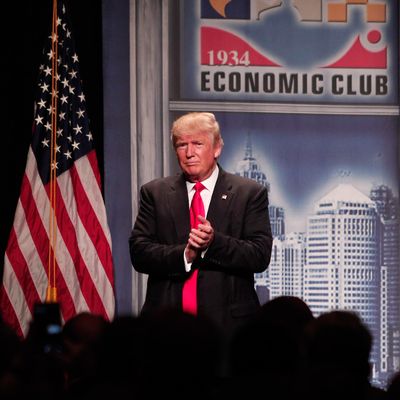
Donald Trump spent much of last week attacking the bereaved parents of an American war hero, picking arbitrary fights with his party’s leadership, and expressing his distaste for babies. These stances did not poll well.
Thus, the GOP nominee tried to change the conversation Monday, by focusing on the issues that really matter to the American people — like increasing the inheritance enjoyed by the children of millionaires, slashing regulations on Wall Street, and accelerating the onset of catastrophic climate change.
One of the few redeeming features of Trump 2016 has been the mogul’s willingness to flout the conservative movement’s discredited economic orthodoxy. At various points in his primary campaign, Trump suggested that rich Americans pay too little in taxes, endorsed an increase in the minimum wage, championed a $1 trillion stimulus to rebuild America’s infrastructure, and vowed to defend Social Security and Medicare against future cuts. But in his big speech on economic policy in Detroit, a bored-looking Trump just read GOP boilerplate off a teleprompter.
“All Hillary Clinton has to offer is more of the same: more taxes, more regulations, more bureaucrats, more restrictions on American energy and American production,” Trump told a crowd of his fellow one-percenters (and no small number of disruptive protesters) at the Detroit Economic Club, before announcing his intention to slash “job-killing” taxes and regulations.
The agenda Trump outlined Monday was virtually identical to the standard GOP plan for redistributing wealth to its donor class, save for the tycoon’s opposition to all trade deals and refugees (at one point Trump argued that “our roads and bridges fell into disrepair” because we “resettle millions of refugees at taxpayer expense”). This minor innovation allowed Trump to put a patina of anti-globalist populism on the Paul Ryan budget.
“The one common feature of every Hillary Clinton idea is that it punishes you for working and doing business in the United States,” Trump said. “Every policy she has tilts the playing field towards other countries at our expense.”
Trump used this frame to paint America’s 35 percent corporate tax rate as a giveaway to foreign nations, whose lower corporate rates seduce American companies off our shores. Trump’s plan would cut that rate down to 15 percent.
The GOP nominee also moderated his broader tax-reform package, which initially called for reducing the top marginal rate on personal income to 25 percent. Under the plan he outlined Monday, the wealthiest people in America would enjoy a more modest reduction in their tax burdens, as the top marginal rate would fall from 40 percent to 33. He would also reduce the number of tax brackets from seven to three, setting the bottom two rates at 25 and 12 percent. This is undoubtedly a deficit-exploding tax cut for the rich, but it is a tad more responsible than the $10 trillion tax cut Trump started with.
The self-proclaimed billionaire retained just two (quasi-) populist proposals on fiscal policy. First, Trump called for eliminating the carried interest deduction, which allows some wealthy investment managers to pay far below the top marginal rate on their income. But this gesture toward progressive taxation doesn’t hold up upon inspection, as Trump’s other tax cuts will allow many hedge-fund managers to pay as much as 9 percent less to Uncle Sam than they currently do.
Second, Trump proposed a tax deduction that would allow parents to subtract the average cost of childcare from their IRS bill. But by structuring this benefit as a deduction — instead of as a tax credit — Trump has essentially crafted a welfare program that America’s neediest families can’t access.
Along with these lukewarm appeals to the center of the electorate, Trump doled out hot slabs of red meat to the Republican donor class. The GOP nominee called for repealing “the death tax,” which is to say the tax on the estates of multimillionaires. There is no public interest in repealing this tax, unless one believes that the American economy is currently plagued by too little inequality. Then the candidate who has accused his opponent of being “controlled” by Wall Street proposed a moratorium on all new federal regulations, including those aimed at financial institutions. Finally, Trump pledged to revive the coal industry by repealing Obama’s Clean Power Plan.
While Trump didn’t mention entitlement reform, he also didn’t vow to defend those programs. And his combination of tax cuts, vows to increase spending on the military and law enforcement, and the bipartisan fear of growing deficits would almost certainly require cuts to America’s threadbare social safety net. Thus, the forecast for the Trump economy looks like austerity, with a chance of trade war.
It’s possible Trump’s gloss of nationalism — and status as an ersatz business genius — will spur some support for this dismal agenda. Even as his poll numbers have collapsed, Trump has maintained a narrow edge over Clinton on “the economy” in some surveys.
Certainly, it’s better to be the anti-tax candidate than the “anti-baby” one. But if Trump is really trailing Clinton by seven points in Georgia right now, it’s hard to imagine this speech will save him.






























